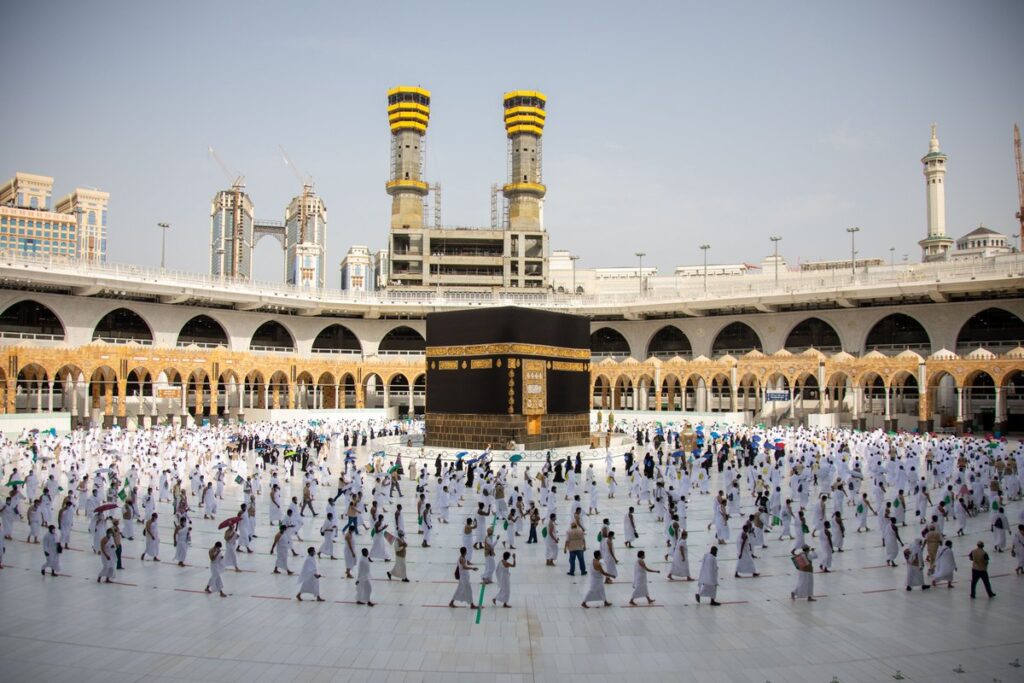The importance of Hajj in the Quran and Hadith cannot be denied. Hajj is the sacred journey towards Allah SWT’s dwelling. Millions of Muslim pilgrims see Allah’s house yearly because of its religious significance.
In the Islamic religion, it is regarded as a significant religious activity. This is why many Muslims highly value the rites’ essential procedures and rules.
Allah SWT has made the journey obligatory for all of his followers. To help you understand why Muslims from all cultural backgrounds come together to do the Hajj in a single area. It’s crucial to consider the Quran and Hadith in context.
That’s precisely what we’re going to accomplish for you down below.
Table of Contents
Importance of Hajj in the light of Holy Quran
In Islam, the Hajj is a collection of many acts of worship. Prayer, generosity, Zakat, excellent character, fasting, spending money for Allah’s sake, patience, and Jihad are all examples. It is said to purify one’s soul and bring one along with a new path of spiritual greatness and happiness. Importance of hajj in quran and hadith is overwhelming.
The following is what the Quran says regarding pilgrimage:
“Verily, the first House (of worship) established for mankind was that of Bakkah (Makkah), which was full of blessings and instruction for Al-‘Alamin” (the humankind and jinns”. [Quran 3:96]
There are visible indicators (such as the Maqam (place) of Ibrahim (Abraham); whoever visits it finds security. And Hajj (pilgrimage to Makkah) to the House (Kaaba) is a duty that humanity owes to Allah, those who can afford the expenses (for one’s conveyance, provision, and residence). Whoever disbelieves [i.e., denies pilgrimage to Makkah], then Allah does not require any of the ‘Alamin (humans and jinns).”
The passages mentioned above in the Quran plainly show that this is a delightful journey to Allah’s abode.
Those who believe and pay attention will reap great rewards. Every believer must make the pilgrimage, as those who do not believe in pilgrimage are considered disbelievers in Allah.
A look at the Hajj Through the Lens of Hadith:
The significance of Hajj is well-documented in Hadith from the Holy Prophet PBUH. This once-in-a-lifetime prayer absolves the pilgrim of all sins.
Allah has given us a magnificent gift. The Holy Prophet PBUH stated the following Hadith regarding the five pillars of Islam.
“Anyone who undertakes Hajj for Allah’s pleasure while avoiding all types of sin will return sin-free, as he was on his first birthday.” [Volume 2, Book 26, Number 596]
This remuneration is stated in another Hadith of the Holy Prophet as similar to that of heaven in the Hereafter. Hajj Mabrur is the name given to the one performed with no fault. Which is enough to show the importance of the pilgrim’s journey within the religious text and Hadith.
“The removal of sins will occur between one pilgrim’s journey to a different. pilgrim’s journey Mabrur encompasses a vital reward of Paradise.”
Every believer who embarks upon this sacred pilgrim’s journey may be a guest from God. The pilgrim’s journey is one of the best ways accustomed attain God’s pleasure.
The Hadith below mentions this. Without a doubt, this shows the importance of the pilgrim’s journey within the religious text and Hadith.
“Pilgrims and people activity Umrah are Allah’s guests; their prayers are answered and their supplications for forgiveness are granted.”
The Pilgrim's Expedition and Its Importance in Islam
Over two million Muslims worldwide are starting the five-day pilgrim’s journey on Friday. They will highlight Islam’s most holy website, the cubic Kaaba in Mecca, and partake in a series of rituals meant to get more considerable unity and humility among Muslims.
The pilgrim’s expedition this year arrives at a time of heightened sectarian and political tensions within the Persian Gulf. Muslim minorities in China, Myanmar, India, New Zealand, and alternative countries face hyperbolic threats, even attacks.
Here’s a glance at the pilgrim’s journey and what it suggests for Muslims:
What Is The Aim Of The Hajj?
The pilgrim’s journey may be a pillar of Islam, needed by all Muslims once in the same period. It’s a physically demanding journey that Muslims believe offers an opportunity to wipe clean past sins and begin afresh before God.
Pilgrims ask to deepen their religion on the pilgrim’s journey, with some ladies adopting the pinnacle covering called the “hijab.”
Despite the physical challenges, many folks approve crutches or canes and demand walking through the routes. Charities or community leaders typically support those who cannot afford the pilgrim’s journey. Others save their entire lives to form the hajj’s journey.
What Is The History Of The Hajj?
While following the way the Prophet Muhammad once walked or made for the Muslim Ummah, Muslims trace the rites of the pilgrim’s expedition back to the prophets patriarch and Ismail, or Ibrahim and Ishmael as they’re named within the Bible.
Muslims have faith that Ibrahim’s religion was tested once God commanded him to sacrifice his sole son Ismail. Ibrahim was willing to have the command; on the other hand, God stayed his hand, frugal his son.
Within the Christian and soul version of the story, Ibrahim is ordered to kill his alternative son, Isaac. Pilgrims additionally trace the trail of Ibrahim’s married woman, Hajra, UN agency Muslims believe ran between 2 hills seven times to search for water for her dying son. Tradition holds that God then brought forth a spring that runs to the present day.
Why is Kaaba Important for Muslims?
Islamic tradition states that the Kaaba was formulated by the patriarch and Ismail as a house of monotheistic worship thousands of years ago.
Over the years, the Kaaba was reconstructed and attracted different varieties of pilgrims UN agency once lived within the Arabian Peninsula. In pre-Islamic times, the Kaaba was accustomed to housing pagan idols adored by native tribes.
Muslims don’t worship the Kaaba; however, it’s Islam’s most holy site; consequently, it symbolizes the nonliteral house of God and, therefore, the unity of God in Islam.
Observant Muslims around the world face the Kaaba throughout their 5 daily prayers.
What Are The Rituals Performed Throughout The Hajj?
Pilgrims enter into a state of no secular purity called “ihram” that’s geared toward shedding symbols of materialism, forgoing worldly pleasures, and specializing in the inner self over outward look.
Women forgo makeup and fragrance and wear baggy covering and a veil, whereas men dress in seamless, white terry cloths.
The white clothes are proscribed from containing any sewing, a restriction meant to emphasize the equality of all Muslims and stop wealthier pilgrims from differentiating themselves with many elaborate clothes.
The First Day Of Pilgrim’s Journey
The pilgrim’s journey historically begins in Makkah, with a smaller “umrah” pilgrim’s journey, which might be performed year-round. To perform the umrah Muslims walk through the Kaaba counter-clockwise seven times whereas, reciting supplications to God, then walk between the 2 hills traveled by Hajra in search of water. Makkah Grand house of prayer, the world’s largest, encompasses the Kaaba and the 2 hills.
Before heading to Makkah, several pilgrims additionally visit the Saudi town of Medina, wherever the Prophet Muhammad is buried and wherever he formulated the former house of supplication.
The Second Day Of Pilgrim’s Journey
After defraying the night within the significant depression of the mynah bird, the pilgrims head to Mount solon, some twenty kilometers (12 miles) east of Mecca, for the top of the pilgrim’s journey.
Thousands of people will scale a hill known as Jabal al-Rahma or Mountain of Mercy. It’s here wherever the Prophet Muhammad delivered his final sermon, occupation for equality among humans, human rights, women’s rights, and Muslim unity.
He makes them realize women’s rights; each Muslim life and property are sacred. Around sunset, pilgrims head towards a section named Muzdalifa, which is nine kilometers (5.5 miles) west of solon.
Many walk, meanwhile others utilize vehicles. They pay the night there and obtain pebbles on the means that may be utilized in a symbolic corporal punishment of the devil back in mynah bird, wherever Muslims believe the devil tried to speak patriarch out of submitting to God’s can.
The Final 3 Days Of The Pilgrim’s Journey
3 events mark the last 3 days of the pilgrim’s journey:
- A final circle walk of the Kaaba
- Throwing stones on the mynah bird
- Taking off the ihram
Men usually shave their heads, and ladies clip a lock of hair at the top to signify renewal. The final days of the pilgrim’s journey coincide with Eid al-Adha, or the pageant of sacrifice, celebrated by Muslims worldwide to commemorate Ibrahim’s take a look at religion.
Throughout the three-day Eid, Muslims sacrifice placental and share the meat with the poor.



